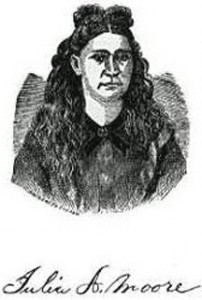Michigan’s Less Than Sweet Singer
- Share
- Tweet
- Pin
- Share
In last week’s Peninsula Pulse, Sally Slattery wrote an article about the Third Avenue Playhouse production of Souvenir, which is based on the life of Florence Foster Jenkins, an incredibly bad opera singer. Reading Sally’s story reminded me of Ms. Julia A. Moore, an absurdly bad poet that achieved a degree of fame (or infamy) near the end of the 19th century.
The following is a synopsis of Ms. Moore’s “poetic” life from the Flint Public Library in Michigan:

Julia Moore
“Julia A. Moore gained national attention and a wide popular following because of her inept and dreadful verse. Her first book, The Sweet Singer of Michigan was published in 1876 to a loud and raucous chorus of literary boos. Book reviewers gleefully criticized the poetess for her maudlin poems, which featured forced rhyme, ridiculous wording and inconsistent and poor meter. Reviewers called it ‘a milepost in the history of bad poetry,’ and were moved to exclaim, ‘we know nothing like it in ancient or modern literature and on the whole we are not sorry,’ and declared, ‘Shakespeare could he read it, would be glad that he was dead.’
“The other singular quality of Moore’s poetry was its laugh out loud, unintentional humor. No matter how hard the Michigan poet tried to write serious verse it nearly always turned out funny. Mark Twain counted her as his favorite poet because she made him laugh and Twain modeled the character Emmeline Grangerford in Huckleberry Finn after the Michigan poet. Stephen Leacock, in his 1938 book, Humor and Humanity: An Introduction to the Study of Humor, called Julia Moore America’s ‘greatest super-comic poet.’”
In 1877, Ms. Moore gave a reading and singing performance at the Grand Rapids Opera House, accompanied by an orchestra. Staying true to her delusions, she managed to interpret the cascade of jeers and laughter from the audience as being directed to the orchestra. So undeterred she gave a second reading the following year at the same opera house. By this time, however, she had apparently come to the recognition that the jeers directed her way were sincere and that any praise was intended as mockery.
She began her second performance by stating that her poetry was “partly full of mistakes” and then went on to deliver a wonderful quote: “Literary is a work very hard to do.”
When the laughter subsided at the end of her second reading she closed by saying, “You have come here and paid 25 cents to see a fool; I receive $75, and see a whole houseful of fools.”
Unable to leave well enough alone, Ms. Moore responded to her critics in print with a letter to the editor of a local newspaper. Her letter was widely re-published in other newspapers across the country. Unfortunately, for all of us, her “letter” took the form of a poem and though it pains me to do so, I’ll reprint it one more time in this week’s column.
“To My Friends and Critics”
Come all you friends and critics,
And listen to my song,
A word I will say to you,
It will not take me long,
The people talks about me,
They’ve nothing else to do
But to criticise their neighbors,
And they have me now in view.
Perhaps they talk for meanness,
And perhaps it is in jest,
If they leave out their freeness
It would suit me now the best,
To keep the good old maxim
I find it hard to do,
That is to do to others
As you wish them do to you.
Perhaps you’ve read the papers
Containing my interview;
I hope you kind good people
Will not believe it true.
Some Editors of the papers
They thought it would be wise
To write a column about me,
So they filled it up with lies.
The papers have ridiculed me
A year and a half or more.
Such slander as the interview
I never read before.
Some reporters and editors
Are versed in telling lies.
Others it seems are willing
To let industry rise.
The people of good judgment
Will read the papers through,
And not rely on its truth
Without a candid view.
My first attempt at literature
Is the “Sweet Singer” by name,
I wrote that book without a thought
Of the future, or of fame.
Dear Friends, I write for money,
With a kind heart and hand,
I wish to make no Enemies
Throughout my native land.
Kind friends, now I close my rhyme,
And lay my pen aside,
Between me and my critics
I leave you to decide.

